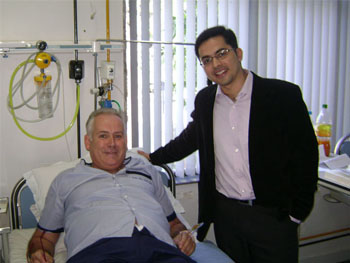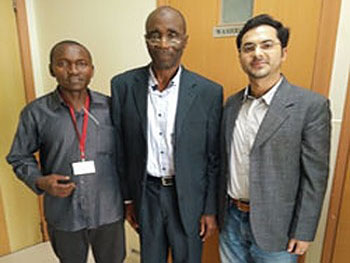Best Price Gallbladder Cancer Treatment In India
What is the Cost of Gallbladder Cancer Treatment with Top Hospitals and Top Surgeons in India?
- The average cost of the Gallbladder Cancer Treatment is very high in western countries.
- India is known worldwide for its advanced medical facilities and promising technology for Gallbladder Cancer Treatment. Many of the best hospitals for Gallbladder Cancer Treatment can be found in India.
- Gallbladder Cancer Treatment cost in India is much less when compared to any other countries. Also the cost of Gallbladder Cancer Treatment in India is substantially lower than other developed countries of the world.
- The average cost of Gallbladder Cancer Treatment in India approximately Rs. 2,40,000 ($3,000) to 4,80,000 ($6,000).
Various deciding factors could determine the price of Gallbladder Cancer Treatment in India. These can be broadly classified as Hospital, Medical Team or Patient Dependent factors.
Hospital Factors
- Type of the hospital (Government/Trust/Private).
- Use of insurance, type of insurance or self paid.
- Accreditation of the facility
- Reputation and brand value of the hospital.
Medical Team Factors
- Technology / Approach Used
- Surgery Type
- Type of Anesthesia or Sedation
- Qualification / Expertise of the specialist
- Extent of the surgery needed
Patient Factors
- Patient’s diagnosis
- Patient’s general health
- Room Category selected by the patient
- Other treatment required by the patient in conjunction
The LIST of AVERAGE COST of the Gallbladder Cancer Treatment across TOP 15 cities in India in Indian Rupee (INR) is as follows –
| City | Lowest Cost | Average Cost | Highest Cost |
|---|---|---|---|
| New Delhi | 2,40,000 | 3,50,000 | 4,75,000 |
| Mumbai | 2,35,000 | 3,25,000 | 4,50,000 |
| Chennai | 2,50,000 | 3,50,000 | 4,80,000 |
| Bangalore | 2,55,000 | 3,60,000 | 4,95,000 |
| Hyderabad | 2,50,000 | 3,55,000 | 4,85,000 |
| Ahmedabad | 2,65,000 | 3,60,000 | 5,00,000 |
| Nagpur | 2,25,000 | 3,00,000 | 4,25,000 |
| Pune | 2,35,000 | 3,25,000 | 4,50,000 |
| Gurgoan / Gurugram | 2,40,000 | 3,50,000 | 4,75,000 |
| Kolkata | 2,60,000 | 3,60,000 | 5,00,000 |
| Chandigarh | 2,50,000 | 3,55,000 | 4,85,000 |
| Jaipur | 2,55,000 | 3,60,000 | 4,95,000 |
| Noida | 2,40,000 | 3,50,000 | 4,75,000 |
| Kerala | 2,65,000 | 3,60,000 | 5,00,000 |
| Goa | 2,60,000 | 3,60,000 | 5,00,000 |
Our Hospitals Network and Surgery Group are available in 15 cities of India for our patients to access. Kindly fill up the form for a free opinion from our expert team. We shall get you a Free, No Obligation Opinion from India's best Surgeons and best Hospitals in India. NO CHARGES LEVIED
Special ALL SERVICES INCLUSIVE Packages available for INTERNATIONAL PATIENTS
Post a QueryIntroduction
Gallbladder cancer is a cancer which starts in the gallbladder. As per the estimates by the American Cancer Society cancer of the gallbladder and nearby large bile ducts in the United States are about 11,740 new cases being diagnosed of which 5,320 in men and 6,420 in women and around 3,830 deaths with these cancers. Of these new cases a little less than 4 in 10 will be gallbladder cancers. The chances of survival for the gallbladder cancer patients depend on a large extent on how advanced it is when it is found. To understand this cancer, it helps to know about the gallbladder and what it does. Gallbladder Cancer is a rare, yet deadly. The five year survival (a metric to assess cancer outcomes) is less than 3-8% for gallbladder cancer stage 4 The Gallbladder.
The Gallbladder
The gallbladder is a small, pear-shaped organ under the liver and both gallbladder and liver are behind the right lower ribs. Usually, the gallbladder is about three to four inches long in adults and no wider than an inch.
The gallbladder concentrates and stores bile, a fluid made in the liver which helps digest the fats in foods as they pass through the small intestine. Either the bile is released from the liver directly into the ducts which carry it to the small intestine or it is stored in the gallbladder and released later. When the food is being digested, the gallbladder contracts and releases bile through a small tube called the cystic duct which joins up the common hepatic duct that comes from the liver to form a common bile duct. The common bile duct joins with the main duct from the pancreas to empty into the duodenum at the ampulla of Vater.
The gallbladder is helpful but you do not need it to live. Most people have their gallbladders removed and go on to live normal lives.
Types of Gallbladder Cancers
As there are lots of different types of cells in the gallbladder, there is more than one type of gallbladder cancer. The type of cell where the cancer developed originally from within the gallbladder decides the exact type of cancer. Over 85% of gallbladder cancers are adenocarcinoma and other rare types together make up the rest 15%.
Phone Numbers Reach Us -
India & International : +91 9371770341
Adenocarcinoma
The cancer started in the gland cells in the gallbladder lining. Normally the gland cells procedure mucus. There are three types of adenocarcinomas of the gallbladder.
- Non papillary adenocarcinomas (75% diagnosed with it)
- Papillary adenocarcinomas (6% diagnosed with it)
- Mucinous adenocarcinomas (1 to 2% are diagnosed with it)
Squamous cell cancer of the gallbladder
It develops from the skin like cells which form the lining of the gallbladder along with the gland cells.
Small cell cancer of the gallbladder
It is also called as oat cell carcinomas because the cancer cells are a distinctive oat shape.
Adenosquamous cancer of the gallbladder
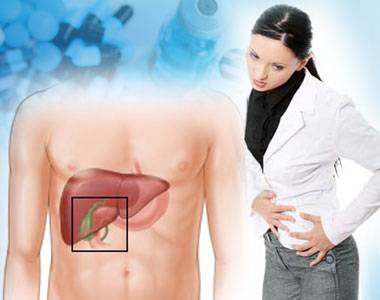
These are cancers having both squamous cancer cells and glandular cancer cells and doctors call it mixed histology.
Neuroendocrine tumor of the gallbladder
Also called as carcinoid, these are rare cancers which grow from the hormone producing tissues, often in the digestive system.
Sarcoma of the gallbladder
It is cancer which affects the supportive or protective tissues of the body also called as the connective tissues such as blood vessels, muscles and nerves. A cancer that starts in the muscle layer of the gallbladder is called a sarcoma.
Lymphoma and melanoma of the gallbladder
These are extremely rare types of gallbladder cancer which are not necessarily treated the same way as other gallbladder cancer types.
Risk Factors for Gallbladder Cancer
The following are risk factors for gallbladder cancer:
- Gallstones
- Porcelain gallbladder
- Gender- gallbladder cancer occurs more than twice often in women than men.
- Older age, more than 2 out of 3 gallbladder cancer are detected in people who are 65 years or older.
- Obesity
- Choledochal cysts
- Ethnicity and geography- Mexican Americans and Native Americans are at higher risk to develop gallbladder cancer. Worldwide, it is much more common in India, Pakistan, Central European and South American countries than in the United States.
- Gallbladder polyps
- Abnormalities in the bile ducts
- Industrial and environmental chemicals such as nitrosamines increase the risk of gallbladder cancer. Workers in the rubber and textile industries are also at higher risks for gallbladder cancer.
- Primary sclerosing cholangitis
- Family history
- Typhoid
- Smoking
Symptoms
The common symptoms are:
- Nausea and/or vomiting
- Abdominal or belly pain
- Lumps in the belly
- Jaundice
- Bloating
- Fever
Other symptoms are less common and include:
- Loss of appetite
- Itchy skin
- Weight loss
- Dark urine
- Light colored or greasy stool
Diagnosis
Most gallbladder cancers are not found until a person goes to a doctor due to the symptoms they have. The diagnosis includes:
- Medical history and physical exam
- Blood tests
- Tumor markers
- Tests of liver and gallbladder function
- Imaging tests
- Computed tomography (CT) scans
- Ultrasound
- Abdominal ultrasound
- Endoscopic or laparoscopic ultrasound
- Magnetic resonance imaging (MRI) scan
- MR angiography (MRA)
- MR cholangiopancreatography (MRCP)
- Cholangiography
- Endoscopic retrograde cholangiopancreatography (ERCP)
- Percutaneous transhepatic cholangiography (PTC)
- Magnetic resonance cholangiopancreatography (MRCP)
- Angiography
- Laparoscopy
- Biopsy
- 5000 PATIENTS TREATED IN LAST 15 YEARS FOR COMPLEX CANCER SURGERY AND ONCOLOGY MANAGEMENT
- TELE CONSULTING AND MEDICAL CONSULT TIE UPS PRESENT IN 15 MAJOR CITIES OF AFRICA AND 6 MAJOR CITIES OF MIDDLE EAST
- CANCER SURGERY FELLOWSHIPS AND TRAINING PROGRAMS AVAILABLE FOR SURGEONS FROM OTHER COUNTRIES
Phone Numbers Reach Us -
India & International : +91 9371770341
Staging
There are four main stages in this system are stages 1 to 4. Some doctor also refers to stage 0.
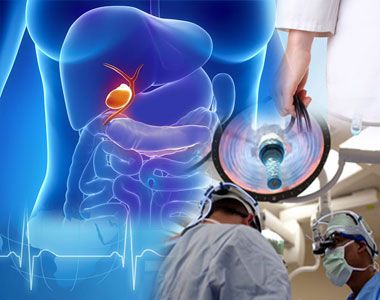
Stage 0: Also called as carcinoma in situ, the abnormal cells are found in the innermost layer of the gallbladder. These abnormal cells may become cancer and spread to nearby tissue.
Stage I: The cancer has formed in stage I, which is divided as follows:
Stage IA: Cancer has spread beyond the innermost layer to the connective tissue or to the muscle layer.
Stage IB: Cancer has spread beyond the muscle layer to the connective tissue around the muscle.
Stage II: It is divided into stage IIA and stage IIB:
Stage IIA: Cancer has spread beyond the visceral peritoneum and/or the liver and/or nearby organ.
Stage IIB: Cancer has spread beyond the innermost layer to the connective tissue and to nearby lymph nodes or to the muscle layer and nearby nodes or beyond the muscle layer to the connective tissue around the muscle and to nearby lymph nodes or through the visceral peritoneum and/or liver and/or one nearby organ and to nearby lymph nodes.
Stage III: Cancer has spread to a main blood vessel in the liver or to nearby organs and may have spread to nearby lymph nodes.
Stage IV: Cancer has spread to nearby lymph nodes and/or to organs far away from the gallbladder.
Recurrent Gallbladder Cancer: It is cancer which has recurred after it has been treated. The cancer may come back in the gallbladder or in other parts of the body.
Top 10 Gallbladder Cancer Surgeons in India
- DR. MANISH JOSHI
- DR. SANJAY SINGH NEGI
- DR. SUDHIR TOMEY
- DR. BALA CHANDRAN TG
- DR. MANDEEP SINGH
- DR. PARITOSH S GUPTA
- DR. HARIT CHATURVEDI
- DR. ASHOK VAID
- DR. DURGATOSH PANDEY
- DR.HARI GOYAL
- DR. MEENU WALIA
- DR. S HUKKU
- DR. RAJESH JINDAL
- DR. KAPIL KUMAR
- DR. VEDANT KABRA
- DR. ANSHUMAN KUMAR
- DR. RAHUL BHARGAVA
- DR. RANGARAJU RANGA RAO
- DR. AMIT AGARWAL
- DR. RAJESH MISTRY
Top 10 Gallbladder Cancer Surgeons in India
- INDRAPRASTHA APOLLO HOSPITAL, NEW DELHI
- GLOBAL HOSPITALS, HYDERABAD
- MAX SUPER SPECIALTY HOSPITAL, SAKET, NEW DELHI
- APOLLO CANCER INSTITUTE DELHI
- PUSHPAWATI SINGHANIA RESEARCH INSTITUTE, NEW DELHI
- ARTEMIS HOSPITAL, GURGAON
- HCG HOSPITALS, BANGALORE
- FORTIS HOSPTIAL, NOIDA
- FORTIS MEMORIAL RESEARCH INSTITUTE, GURGAON
- JAYPEE HOSPITAL NOIDA
- FORTIS ESCORTS HEART INSTITUTE, NEW DELHI
- BLK SUPER SPECIALITY HOSPITAL, NEW DELHI
- NARAYANA MULTISPECIALTY HOSPITAL, BENGALURU
- KOKILABEN DHIRUBHAI AMBANI HOSPITAL, MUMBAI
- FORTIS HOSPITAL, BANGALORE
- MANIPAL HOSPITAL BANGALORE
- RAJIV GANDHI CANCER INSTITUTE AND RESEARCH CENTRE
Treatments
The Gallbladder Cancer Best Treatment options depend on several factors such as type and stage of cancer, possible side effects, patient’s overall health and preferences. Take time to learn about all the treatment options and ask questions to your doctor as to what you can expect while receiving the treatment.
Surgery
It is an operation to remove the tumor and some surrounding healthy tissue. A surgical oncologist who specialized to treat cancer using surgery may use the following types of surgery for treating gallbladder cancer:
- Cholecystectomy: Also called as a simple cholecystectomy, it involves removing gallbladder. An extended cholecystectomy involves removing gallbladder, 1 inch or more of liver tissue located next to the gallbladder and all of the lymph nodes in the region.
- Radical gallbladder resection: AIt involves removing the gallbladder, a wedge-shaped section of the liver neat the gallbladder, part of all the ligaments between liver and intestine, common bile duct, and the lymph nodes around pancreas and the nearby blood vessels.
- Palliative surgery: Surgery may sometimes help relieve the symptoms due to gallbladder cancer even if the tumor cannot be removed completely.
Radiation Therapy:
It involves using high-energy X-rays or other particles to destroy cancer cells. Usually it is given by a radiation oncologist. External-beam radiation therapy is the most common type of radiation treatment for gallbladder cancer which is given from a machine outside the body. Often this therapy consists of a specific number of treatments over a set period of time. It may be used before surgery to shrink the size of tumor or after surgery to destroy the remaining cancer cells. Sometimes, it is given during surgery to directly target the area of tumor and protect healthy organs from the effects of traditional radiation therapy, called as an intra-operative radiation therapy IORT.
Chemotherapy
It uses drugs to destroy cancer cells by stopping its ability to grow and divide. Often it is given by a medical oncologist who specializes in treating cancer with medication. The chemotherapy regimen consists of a specific number of cycles over a set period of time. The patient may receive one drug at a time or combinations of different drugs at the same time.
Systemic chemotherapy gets into the bloodstream to reach the cancer cells throughout the body. It is given by an injection, an IV tube placed into a vein using a needle or capsule to be swallowed orally. It may be given before surgery to shrink tumor or after surgery to destroy the remaining cancer cells. It may also be combined with radiation therapy. Usually chemotherapy is used as a palliative care treatment for gallbladder cancer and may be recommended after the tumor has been removed surgically.
Follow-up Care
After completion of treatment, your doctors will watch you closely. It is important to go to all the follow-up appointments during which your doctor will ask you about symptoms, do physical exams and may order imaging tests such as CT scans or blood tests. Many doctors recommend follow-up with imaging tests for every six months for at least first two years if you have had surgery and have no signs of cancer remaining. Follow-up is essential to check for cancer recurrence or spread as well as possible side effects of certain treatments. Ensure to ask your healthcare team any questions you have and discuss about your concerns as well.
As with other cancer treatment, there are certain side effects that may last for a few weeks to months while others can last for rest of your life. Do not hesitate to tell your cancer care team about any symptoms of side effects so that they can help you manage them.
Mrs. Alicia White from Australia sharing her Experience of getting Gallbladder Cancer Treatment in India.

Mrs. Alicia White from Australia
I went to hospital for a normal check up, thinking that I might be having some kind of stomach infection but it was diagnosed that I had a gall bladder cancer. My family lives in another country and I work in India. Alone and shocked, the doctors of Indian cancer surgery group advised me to admit in hospital and start the treatment by the earliest possible. I cannot express enough gratitude towards all the staff members and physicians of the Indian Cancer Surgery Group for making me feel extraordinary by being there to uplift me and guide me every time I needed or there was an emergency.
Phone Numbers Reach Us -
India & International : +91 9371770341
How many patients underwent Gallbladder Cancer Treatment in India in the last 5 years?
- Some of the most coveted Gallbladder Cancer Treatment hospitals in the world are found in India. The country is known for offering advanced medical facilities at the most reasonable cost. The best Gallbladder cancer treatment hospitals in India have a comprehensive solution for the most critical cases of a gallbladder cancer.
- Early diagnosis, surgery or treatment helps to enhance the chances of a successful outcome.
- An average increase of 15 to 20 percent annually has been observed in the number of patients in the last 5 years.
- The Indian Gallbladder Cancer Treatment hospitals deliver advanced oncology care and highest quality services backed by elaborate infrastructure and lower treatment cost.
- Besides, India produces best quality medicines, drugs, and consumables for cancer care at almost one-tenth of the price as is in the developed nations.
Here are the approximate figures of the patients underwent Gallbladder Cancer Treatment in the last 5 years in India
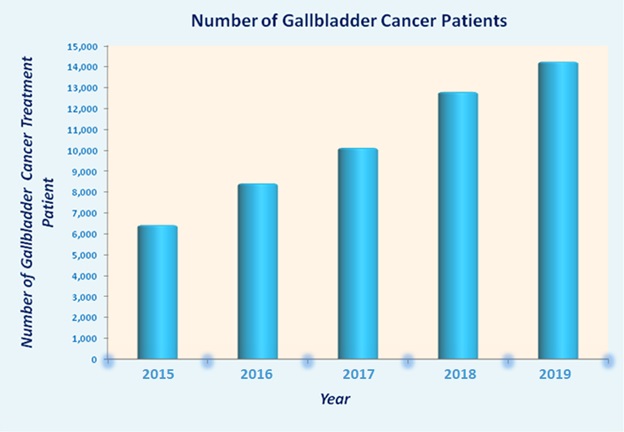
Please consult us to Get free quotes, opinions from Top Hospitals and Best Surgeons of India for Gallbladder Cancer Treatment.
CLICK HERE to get a “No Obligation Quote”Some of the common countries from which patients travel to India for surgery are:
| United States | Bangladesh | SaudiArab |
| Iraq | UAE | South Korea |
| United Kingdom | Oman | Qatar |
| Afghanistan | Sudan | Yemen |
| Canada | Ghana | Jordan |
| France | Nepal | Singapore |
| Mauritius | Australia | Indonesia |
| Ireland | Germany | Egypt |
Our Success Stories
Mr.Richard Cooper Parson, UK
Successful Robotic Radical Prostatectomy in India
Different methodologies are tried when a person encounters cancer in the prostate...
Read More
Mr. Yukub Abbas Ebrarim , South Sudan
Success Story of Pancreatic Cancer In India
India Cancer Surgery Site has served in bulk to its patients by helping them battle against...
Read More
Mr. Charles Nige,
Africa
Breast Cancer Surgery of his Wife In India
Hi! I am Mr. Charles; I am from Africa, to be specific from Nigeria. Recently, my wife...
Read More

 English
English Arabic
Arabic French
French Bangla
Bangla Russian
Russian








